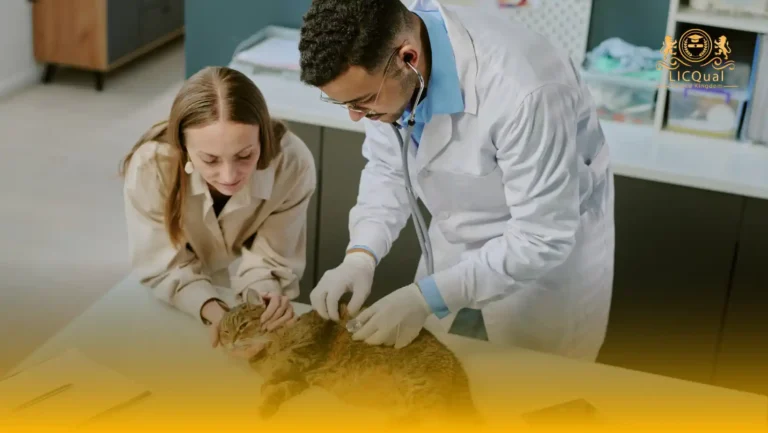The LICQual Level 7 Postgraduate Diploma in Clinical Nutrigenomics (PgD Nutrigenomics) is a highly specialized qualification designed for experienced professionals seeking to advance their expertise in the cutting-edge field of nutrigenomics. This postgraduate diploma is not intended for fresh entrants but is tailored for practitioners, researchers, and healthcare professionals who wish to enhance their career prospects, deepen their scientific knowledge, and enrich their Continuing Professional Development (CPD).
Learners undertaking this qualification will explore the complex interactions between nutrition, genetics, and individual health outcomes, gaining the skills required to apply personalised nutrition strategies in clinical or research settings. The curriculum combines advanced scientific theory with practical insights, enabling learners to critically evaluate emerging evidence and implement effective, evidence-based solutions in professional practice.
LICQual ensures that centres delivering this qualification maintain the highest standards of training excellence. Only centres with competent, qualified staff and access to all necessary resources and materials are approved to offer this programme, guaranteeing that learners receive comprehensive support and high-quality education throughout their studies.
By completing the PgD in Clinical Nutrigenomics, learners position themselves at the forefront of a rapidly evolving field, equipped with the expertise to make significant contributions to personalized healthcare, nutrition consultancy, or academic research. This qualification represents a strategic step for professionals committed to lifelong learning, career progression, and achieving excellence within the healthcare and nutrition sectors.
Course Overview
Qualification Title
LICQual Level 7 Postgraduate Diploma in Clinical Nutrigenomics (PgD Nutrigenomics)
Total Units
6
Total Credits
120
GLH
600
Qualification #
LICQ2201103
Qualification Specification
To enroll in the LICQual Level 7 Postgraduate Diploma in Clinical Nutrigenomics (PgD Nutrigenomics), applicants must meet the following criteria:
|
Qualification# |
Unit Title |
Credits |
GLH |
|---|---|---|---|
|
LICQ2201103-1 |
Advanced Human Genetics and Genomics |
20 |
100 |
|
LICQ2201103-2 |
Nutrigenomics and Personalized Nutrition |
20 |
100 |
|
LICQ2201103-3 |
Advanced Nutritional Biochemistry |
20 |
100 |
|
LICQ2201103-4 |
Clinical Research Methods in Nutrigenomics |
20 |
100 |
|
LICQ2201103-5 |
Ethics, Regulation, and Professional Practice in Nutrigenomics |
20 |
100 |
|
LICQ2201103-6 |
Applied Clinical Nutrigenomics Project |
20 |
100 |
By the end of this course, learners will be able to:
Unit 1: Advanced Human Genetics and Genomics
By the end of this unit, learners will be able to:
- Critically analyse the principles of molecular genetics, genomics, and epigenetics in human health
- Evaluate the impact of genetic variation on metabolism, nutrient absorption, and disease risk
- Interpret and apply genome-wide association studies (GWAS) and other genetic research in a clinical context
Unit 2: Nutrigenomics and Personalized Nutrition
By the end of this unit, learners will be able to:
- Examine the interactions between diet, genetic makeup, and individual health outcomes
- Design personalised nutrition strategies informed by genetic profiles and scientific evidence
- Assess the clinical applications of nutrigenomics in the prevention and management of chronic diseases
Unit 3: Advanced Nutritional Biochemistry
By the end of this unit, learners will be able to:
- Analyse the biochemical mechanisms of macro- and micronutrients at a molecular level
- Evaluate the influence of nutrients on metabolic pathways, cellular functions, and gene expression
- Critically appraise the role of nutrients in epigenetic regulation and overall human health
Unit 4: Clinical Research Methods in Nutrigenomics
By the end of this unit, learners will be able to:
- Demonstrate advanced knowledge of research design, statistical analysis, and critical appraisal methods
- Conduct, evaluate, and interpret clinical trials and observational studies in nutrigenomics
- Apply evidence-based practice principles to translate research findings into clinical interventions
Unit 5: Ethics, Regulation, and Professional Practice in Nutrigenomics
By the end of this unit, learners will be able to:
- Critically assess ethical, legal, and regulatory frameworks governing genetic testing and personalised nutrition
- Demonstrate awareness of data protection, consent, and professional responsibility in clinical practice
- Apply professional standards and frameworks for safe, effective, and ethical integration of nutrigenomics into healthcare
Unit 6: Applied Clinical Nutrigenomics Project
By the end of this unit, learners will be able to:
- Plan, implement, and critically evaluate a research or clinical project in the field of nutrigenomics
- Apply theoretical knowledge to practical, real-world case studies and clinical scenarios
- Demonstrate advanced problem-solving, analytical thinking, and professional communication skills in project delivery
This course is designed for healthcare professionals, nutritionists, and career changers who want to specialise in personalised nutrition based on genetic information. The LICQual Level 7 Postgraduate Diploma in Clinical Nutrigenomics (PgD Nutrigenomics) equips learners with practical skills and industry-relevant knowledge to apply nutrigenomic principles in clinical, wellness, and health consultancy settings, enhancing their professional expertise and career opportunities.
Nutritionists and Dietitians
- Professionals aiming to integrate nutrigenomics into dietary planning
- Dietitians providing personalised nutrition advice to clients
- Nutritionists assessing gene-diet interactions for optimal health outcomes
- Professionals interpreting genetic data for nutrition recommendations
- Staff developing advanced patient-focused dietary strategies
- Nutritionists enhancing practical skills for clinical and wellness applications
Healthcare and Allied Health Professionals
- Clinicians applying nutrigenomics in preventive healthcare
- Nurses and allied health staff integrating personalised nutrition in care plans
- Professionals managing nutrition interventions based on genetic profiles
- Practitioners improving patient outcomes with evidence-based dietary strategies
- Staff enhancing their understanding of gene-nutrition interactions
- Professionals seeking to expand practical expertise in precision nutrition
Clinical and Wellness Practitioners
- Professionals offering personalised nutrition services in wellness clinics
- Practitioners delivering gene-based dietary advice for health optimisation
- Wellness consultants supporting clients with customised nutrition plans
- Staff applying nutrigenomics to manage lifestyle-related conditions
- Professionals building practical knowledge for patient-specific interventions
- Practitioners aiming to provide advanced precision nutrition solutions
Career Changers into Nutrigenomics
- Individuals transitioning from general nutrition or healthcare roles
- Professionals seeking practical skills in personalised nutrition
- Learners aiming to specialise in nutrigenomics and gene-diet research
- Career changers developing expertise for clinical or wellness applications
- Individuals enhancing their professional profile in emerging nutrition fields
- Learners preparing for applied, hands-on roles in nutrigenomics
Researchers and Data-Focused Professionals
- Professionals analysing genetic and nutrition-related data
- Staff conducting research in nutrigenomics and personalised nutrition
- Practitioners applying evidence-based methods to clinical nutrition
- Professionals interpreting gene-diet interactions for practical application
- Researchers supporting health and wellness studies with advanced knowledge
- Staff developing critical thinking and analytical skills in nutrition science
Professionals Seeking Leadership and Specialisation
- Individuals leading clinical nutrition projects with gene-based insights
- Practitioners guiding teams in personalised nutrition services
- Professionals enhancing management skills in health and wellness settings
- Staff developing strategic approaches to gene-based dietary interventions
- Individuals increasing credibility and professional recognition
- Practitioners preparing for senior roles in clinical or wellness nutrition
Public Health and Community Practitioners
- Professionals applying nutrigenomics knowledge in population health initiatives
- Staff developing community-based precision nutrition programmes
- Practitioners supporting health education with gene-informed dietary strategies
- Professionals bridging research findings to practical public health applications
- Staff designing interventions to improve community health outcomes
- Practitioners enhancing population nutrition through personalised approaches
To ensure high-quality delivery and learner success, centres offering the LICQual Level 7 Postgraduate Diploma in Clinical Nutrigenomics must meet the following requirements:
- Qualified and Competent Staff: Centres must employ educators and trainers with advanced qualifications and proven expertise in nutrigenomics, clinical nutrition, or related fields to provide professional, evidence-based instruction.
- Access to Relevant Resources: Centres must provide learners with comprehensive access to up-to-date scientific literature, journals, research databases, and digital learning platforms to support academic study and research.
- Practical and Laboratory Facilities: For courses including practical components, centres must have access to laboratory or clinical facilities where learners can safely apply scientific and research skills.
- Ethical and Regulatory Compliance: Centres must adhere to all relevant legal, ethical, and data protection standards, particularly when handling genetic information or clinical research data.
- Supportive Learning Environment: Centres should offer structured guidance, mentoring, and feedback mechanisms to support learners’ progression, problem-solving, and application of advanced knowledge.
- Assessment and Evaluation Resources: Centres must provide robust systems for assessing learner performance, including research projects, assignments, and practical evaluations aligned with Level 7 standards.
Meeting these requirements ensures that learners receive a high-quality, professional, and fully supported educational experience, enabling them to successfully complete the diploma and advance their careers in clinical nutrigenomics and personalized healthcare.
Assessment and Verification
All units within this qualification are subject to internal assessment by the approved centre and external verification by LICQual. The qualification follows a criterion-referenced assessment approach, ensuring that learners meet all specified learning outcomes.
To achieve a ‘Pass’ in any unit, learners must provide valid, sufficient, and authentic evidence demonstrating their attainment of all learning outcomes and compliance with the prescribed assessment criteria. The Assessor is responsible for evaluating the evidence and determining whether the learner has successfully met the required standards.
Assessors must maintain a clear and comprehensive audit trail, documenting the basis for their assessment decisions to ensure transparency, consistency, and compliance with quality assurance requirements.







